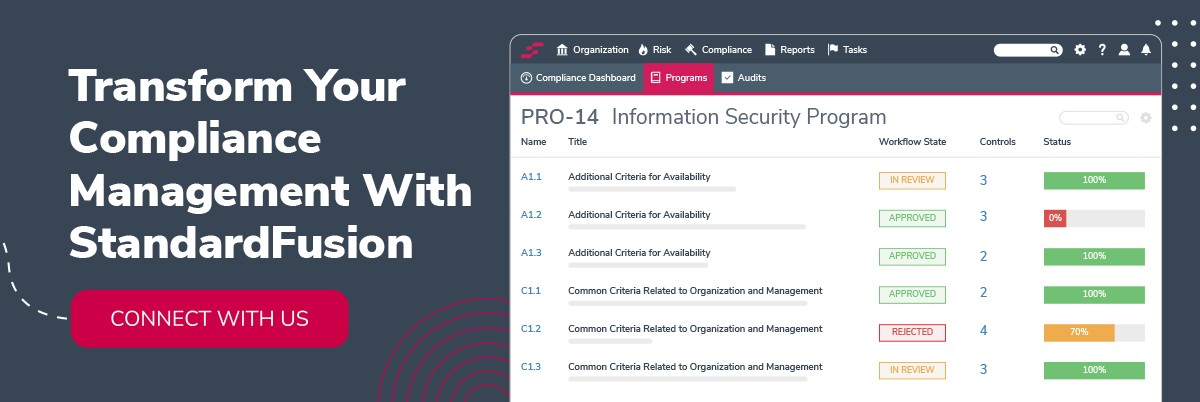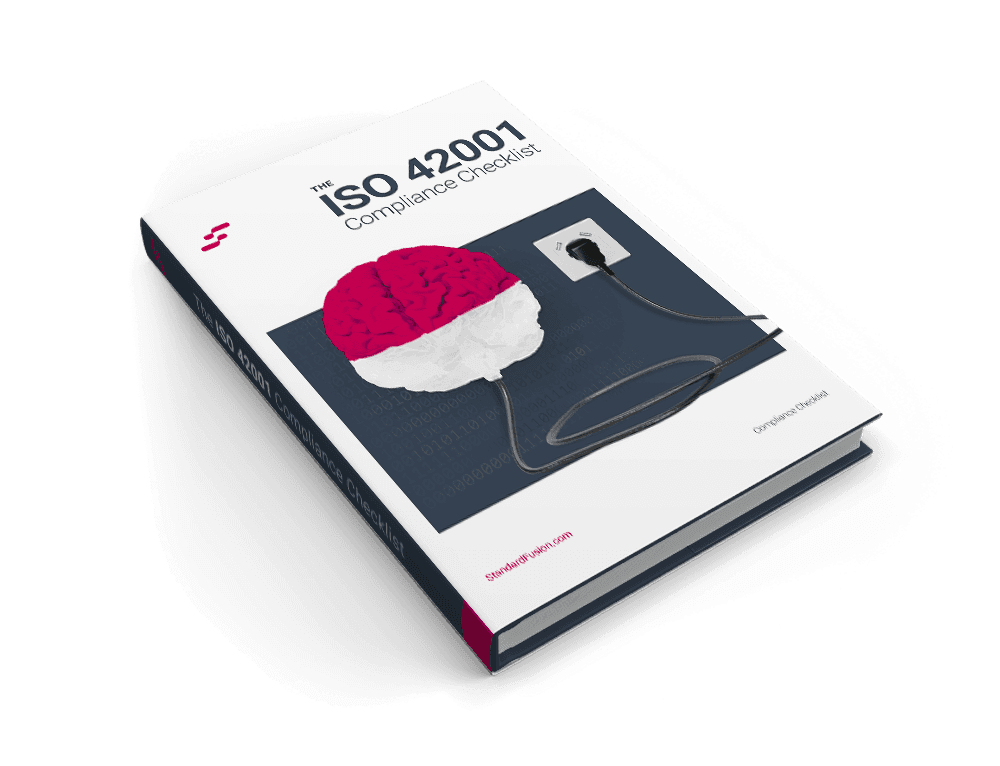Published on: Jun 19, 2024
Data Compliance: Everything You Need to Know in 2024
As AI and other new technologies continue to evolve and be used by all of us, maintaining data compliance becomes the number one priority.
This article will walk you through everything you need to know to keep your data secure and your business compliant.
Let's begin!
What is Data Compliance?
Data compliance refers to the practice of managing and protecting sensitive/relevant data according to established laws, regulations, and industry standards. It is a crucial aspect of information governance that spans various industries, including healthcare, finance, retail, and technology.
Governing data includes defining certain aspects, such as security controls, storage, and handling techniques. This can apply to personal data such as customer details, employee records, and financial information, as well as proprietary business information.
More importantly, by adhering to data compliance requirements, organizations ensure the integrity, confidentiality, and availability of their data.
The result?
Well, you'll reduce the risk of data breaches and other security incidents.
Why is Data Compliance Important?
Well, simply because it is vital in decision-making processes, as it allows organizations to trust their data and make informed decisions based on it.
Furthermore, effective data governance helps organizations comply with regulations, protect sensitive data, and reduce the risks associated with data mismanagement.
Some of the goals of Data compliance are:
Ensuring Data Accuracy
Providing Transparency
Protecting Sensitive Information
Tracking Data Storage
Maintaining Data Integrity
Enforcing Data Access Controls
Facilitating Data Portability
Compliance with Legal Requirements
Enhancing Customer Trust
In a nutshell:
The main benefits of implementing a data compliance program are:
Improved Decision-Making: High-quality, reliable data allows for better decision-making across all levels of the organization.
Regulatory Compliance: A data governance program helps ensure compliance with data-related regulations and standards, reducing the risk of penalties and reputational damage.
Data Security: By defining who can take action upon data, a data governance program helps protect sensitive data and prevent unauthorized access.
Operational Efficiency: Consistent data definitions and formats across the organization can lead to increased operational efficiency.
Risk Management: Data governance helps identify and mitigate risks associated with data mismanagement. .
Increased Revenue: With accurate and consistent data, organizations can uncover opportunities for revenue growth and cost savings.
Enhanced Customer Satisfaction: Accurate data can lead to better customer service, improving customer satisfaction and loyalty.
Trust and Accountability: A data governance program fosters trust in data and accountability for data quality within the organization.

Data-Driven Privacy - Regulations and Standards
Depending on your industry or geographic location you operate, several data-related regulations and standards might be applicable. These requirements profoundly impact your business operations, especially if you operate internationally.
Let's look at some comprehensive data-driven regulations:
General Data Protection Regulation (GDPR)
The General Data Protection Regulation (GDPR) is a major law in the European Union (EU) that governs data protection and privacy. It gives individuals control over their personal data and simplifies the regulatory environment for international businesses.
If your business fails to comply with GDPR and does not protect personal information, you could face fines of up to 10 million euros or two percent of your annual revenue, whichever is higher.
Health Insurance Portability and Accountability Act (HIPAA)
In the United States, the Health Insurance Portability and Accountability Act (HIPAA) sets the standard for protecting sensitive patient data.
If your business deals with protected health information (PHI), you must ensure all required physical, network, and process security measures are in place.
Penalties for non-compliance can range from $10,000 to $50,000 per violation, with an annual maximum fine of $1.5 million.
Sarbanes-Oxley Act (SOX)
The Sarbanes-Oxley Act (SOX) is a U.S. federal law that mandates specific practices in financial record-keeping and reporting. It aims to protect investors by increasing the accuracy of corporate disclosures.
If your company is publicly traded, you must comply with SOX to ensure reliable financial reporting.
Check out our article on ITGC SOX and how it can help you ensure the integrity of financial reports and business practices.
California Consumer Privacy Act (CCPA)
The California Consumer Privacy Act (CCPA) enhances privacy rights for residents of California. It requires businesses to be transparent about their data practices and gives consumers control over their personal information.
If you collect data from California residents, you must comply with CCPA to avoid penalties.
Payment Card Industry Data Security Standard (PCI DSS)
The Payment Card Industry Data Security Standard (PCI DSS) is an information security standard for organizations that handle branded credit cards from the major card schemes. It governs the handling, transmission, storage, and security of sensitive credit, debit, and cash card data.
Failure to comply with PCI DSS requirements can result in fines ranging from $5,000 to $100,000 per month until your business achieves compliance.
International Organization for Standardization (ISO) 27001
ISO/IEC 27001 is an international standard for information security management systems (ISMS). It provides a framework for managing sensitive company information to keep it secure.
Achieving ISO 27001 certification demonstrates your commitment to protecting data and managing risks effectively.
Here you can learn everything about the ISO 27000 series of Standards.
Health Information Trust Alliance (HITRUST)
The HITRUST CSF is a certifiable framework that provides organizations with a comprehensive, flexible, and efficient approach to regulatory compliance and risk management.
It integrates various standards and regulations, making it a widely recognized certification in the healthcare industry.
This is what you must remember:
By adhering to these compliance standards, you can protect your business from significant penalties, maintain customer trust, and ensure your data practices meet global standards.
Implications for Multinational Operations
If your business operates internationally, you know how challenging it can be to navigate different data protection laws and define a unified approach to your data compliance program.
These varied regulations can lead to increased operational costs as you must invest in strong compliance infrastructures and training programs to meet each region's standards.
A survey revealed that 87% of companies working globally struggle to align their data practices with GDPR. Additionally, 92% reported that complying with multiple regulations has significantly increased their operational expenses.
What can you do then?
Strategies for Compliance
To manage these complex regulations, multinational companies (MNCs) have adopted several effective strategies:
Centralized Data Management System: Implementing a centralized system can standardize data practices across all operations, regardless of location. This approach streamlines data handling and ensures consistent compliance, reducing the risk of breaches and non-compliance penalties.
Appointing Data Protection Officers (DPOs): Assigning dedicated DPOs to oversee compliance efforts is crucial. These officers stay updated with the latest data privacy laws and ensure all parts of your organization are informed and compliant.
Using Advanced Analytics and AI Tools: Leveraging advanced analytics and AI-driven tools can help you monitor and manage data compliance effectively. These technologies provide real-time insights into potential compliance risks and automate many manual data governance processes, enhancing efficiency and accuracy.
Data compliance regulations have profound implications for multinational operations. Moreover, as the digital economy continues to grow, staying vigilant and proactive in your compliance efforts is essential.

How Do You Ensure Data Compliance?
The following steps can help you build a compliance program that meets requirements and protects your vital information.
You can start with a couple of things now, while others will need some time. However, with the right approach, you can meet data compliance standards, ensure data privacy, and strengthen your overall information security.
This will help protect your business and customers from data breaches, misuse, and unauthorized access.
1. Understanding Compliance Standards and Data Inventory
Identify Relevant Regulations: Start by identifying the data compliance regulations relevant to your organization. This depends on your industry and location. Key regulations include GDPR, HIPAA, and CCPA.
Develop a Data Inventory: Outline the types of data you collect, where it's stored, and who has access to it. This helps you identify critical data and ensure it is protected.
Classify and Discover Data: Classify data based on its sensitivity and importance. Use data discovery tools to locate and categorize data across your systems, ensuring all data is accounted for.
2. Implementing Immediate Steps
Access Controls: Implement robust access controls to restrict data access to authorized personnel only. This includes user authentication, role-based access, and encryption of sensitive data. A modern identity and access management program can help manage access efficiently.
Secure Data Storage: Ensure your data is stored securely, both physically and digitally. This may involve using encrypted storage solutions, firewalls, and access logs.
Compliance Training: Educate your staff about data compliance regulations and the importance of data privacy. Regular training sessions keep everyone informed about best practices and emerging threats.
3. Establishing Long-Term Data Security Plans
Data Handling Policies: Create clear security policies and procedures for handling data responsibly. Make sure everyone in your organization is aware of and follows these practices..
Audits: Conduct regular audits to verify the effectiveness of your data compliance measures. Identify potential vulnerabilities and areas for improvement. Here is how StandardFusion can adapt, scale, and centralize your audits.
Data Breach Response Plan: Develop a well-defined data breach response plan. Being prepared to respond quickly and effectively can minimize damage and ensure compliance with legal requirements.
4. Building a Data-Compliance Culture
Holistic Approach: Integrate data governance with a comprehensive data management program. Document ownership, procedures, definitions, and policies to support data compliance and operational efficiency.
Continuous Training: Provide ongoing training for your employees through a corporate training curriculum. This includes just-in-time training for new situations, ensuring your staff can handle data-related issues.
Keep Up with Legislation: Stay updated with rapidly changing data compliance laws. Regularly review and update your internal policies to ensure they remain effective and compliant with new regulations.
5. Ensuring Stakeholder Compliance
Supplier Compliance: Extend your data compliance efforts to suppliers, subcontractors, and other stakeholders. Ensure they meet your data protection standards to maintain the security and integrity of the entire data supply chain.
Review Contracts: Regularly review and amend contracts with suppliers to ensure they comply with your data standards. Be prepared to find new suppliers if current ones are unwilling to meet these standards.
6. Leveraging Technology and Frameworks
Modern Data Protection Measures: Use up-to-date data protection strategies to reduce the risk of data breaches. Implement solutions that offer robust record-keeping, quick data recall, and secure data deletion.
Common Controls Framework: Use a Common Controls Framework (CCF) to meet security and privacy compliance requirements while minimizing operational disruption. This helps align your security measures with various compliance standards efficiently.
Compliance Software: Consider using compliance operations software like Hyperproof to manage and streamline your data compliance efforts. Such tools can help keep internal controls up-to-date and provide organized evidence for audits.
Next, you can see a short framework that can help you as well.
Data Compliance Framework
Implementing data compliance in your organization requires careful planning and execution. Follow these steps to establish a solid data compliance framework:
1. Conduct a Risk Assessment
Start by conducting a comprehensive risk assessment. Identify the types of data your organization handles, where it's stored, who has access to it, and the potential risks associated with it. Understanding these elements is crucial for determining the scope of your compliance efforts. Here you can learn about our risk management tool.
2. Develop a Data Protection Policy
Based on your risk assessment, develop a strong data protection policy. This policy should outline how you will protect the data you handle, including measures to prevent data breaches and procedures to follow if a breach occurs.
3. Implement Data Protection Measures
Put the measures outlined in your data protection policy into action. This includes:
Technical measures: Such as encryption and access controls.
Organizational measures: Such as staff training and awareness programs.
4. Monitor Compliance
Regularly monitor your compliance with the data protection policy and applicable laws. Conduct regular audits and reviews of your data handling practices to ensure everything is up to standard.
5. Review and Update Your Framework
Data protection is an ongoing effort. As your organization grows and new data protection laws are introduced, regularly review and update your data compliance framework to keep it effective and compliant.
By following these steps, you can establish a data compliance framework that meets legal requirements and protects your valuable data assets.
Remember, data compliance is not just about avoiding fines and penalties - it's about protecting your reputation and earning the trust of your customers.
To maintain the effectiveness of your data compliance efforts, continuous training and regular audits are essential.

Future Trends in Data Compliance
Upcoming Regulatory Changes
The landscape of data compliance is rapidly evolving. To stay ahead, you need to ensure your business is compliant with current regulations and prepared for future changes. Significant shifts in data compliance regulations are expected in the coming years, driven by technological advancements, increased data breaches, and a stronger focus on consumer privacy rights.
Predicting Regulatory Changes
Here are some key trends likely to shape the future of data compliance:
Stricter Privacy Laws: As digital footprints expand, governments worldwide are expected to enact stricter privacy laws, similar to the GDPR in the European Union. These laws will demand greater transparency from businesses regarding data collection, usage, and sharing. Moreover, implementing a robust data compliance framework, staying updated with regulations, and leveraging modern technologies are essential steps in ensuring data security and compliance.
Enhanced Data Security Measures: With cyber threats becoming more sophisticated, regulatory bodies will mandate more robust security measures to protect sensitive information. This could include end-to-end encryption, multi-factor authentication, and regular security audits.
Global Standardization: There is a growing call for a harmonized approach to data compliance. We may see the emergence of global standards that streamline compliance for businesses operating in multiple jurisdictions.
Consumer Empowerment: Regulations will likely give consumers more control over their data. This includes the right to access, correct, and delete personal information held by businesses.
The Rise of Automated Compliance Tools
Automated compliance tools are transforming data compliance. Here's how they are changing the landscape:
Real-Time Monitoring: Cutting-edge software now offers real-time monitoring of data transactions. This allows you to detect and address compliance issues as they occur, significantly reducing the risk of non-compliance.
Evidence Collection: Automated tools can collect and store evidence of compliance, which is crucial during audits. This provides verifiable proof that your business adheres to regulatory standards.
Data Mapping and Classification: New tools can intelligently map and classify data, ensuring that sensitive information is handled and protected according to legal requirements.
Risk Assessment: Advanced algorithms can assess the risk levels associated with different types of data, guiding you on where to focus your compliance efforts.
Services Enhancing Compliance Management
In addition to tools, specialized services are emerging:
Compliance as a Service (CaaS): Some companies now offer CaaS, where compliance management is outsourced to experts who use advanced tools to ensure data protection regulations are met.
Consultancy and Training: There is a growing market for consultancy services that help businesses understand and implement compliance tools. Training programs are also available to educate employees on best practices.
Using automated compliance tools and specialized services can help you streamline your data compliance efforts and ensure your organization remains compliant even when the law keeps changing.
Final Thoughts
Data compliance is not just a regulatory requirement but a critical aspect of business operations. Remember that by adhering to data compliance standards, you can protect your data, reduce risks, and build trust with your customers.
Moreover, implementing a robust data compliance framework, staying updated with regulations, and leveraging modern technologies are essential steps in ensuring data security and compliance.
Book a demo with our team to learn more about how StandardFusion can help you optimize and automate your data using one powerful solution.







